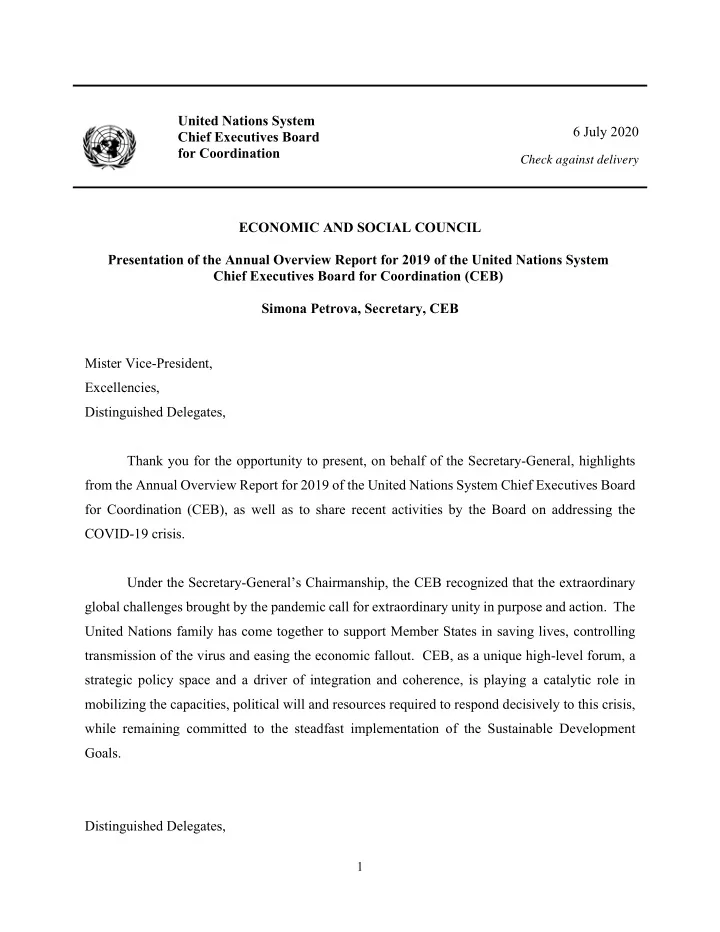

United Nations System 6 July 2020 Chief Executives Board for Coordination Check against delivery ECONOMIC AND SOCIAL COUNCIL Presentation of the Annual Overview Report for 2019 of the United Nations System Chief Executives Board for Coordination (CEB) Simona Petrova, Secretary, CEB Mister Vice-President, Excellencies, Distinguished Delegates, Thank you for the opportunity to present, on behalf of the Secretary-General, highlights from the Annual Overview Report for 2019 of the United Nations System Chief Executives Board for Coordination (CEB), as well as to share recent activities by the Board on addressing the COVID-19 crisis. Under the Secretary-General’s Chairmanship, the CEB recognized that the extraordinary global challenges brought by the pandemic call for extraordinary unity in purpose and action. The United Nations family has come together to support Member States in saving lives, controlling transmission of the virus and easing the economic fallout. CEB, as a unique high-level forum, a strategic policy space and a driver of integration and coherence, is playing a catalytic role in mobilizing the capacities, political will and resources required to respond decisively to this crisis, while remaining committed to the steadfast implementation of the Sustainable Development Goals. Distinguished Delegates, 1
CEB’s agenda in 2019 focused on a number of forward-looking initiatives that have taken on added significance in light of the imperative to support a sustainable post-pandemic recovery. The Board focused on inter-connected frontier issues aiming to provide future-aware analysis and enhance the UN family’s ability to proactively address complex, rapidly changing and unpredictable challenges. This resulted in an integrated set of system-wide approaches and reflections on the future of work, the future of education and learning, and the future of food, as well as support to capacity development in the field of artificial intelligence. Final versions were issued as official UN documents during the course of 2019. But due to the pandemic, in many ways, “the future of” has become “the reality of”. In just over 100 days we have witnessed accelerated trends in almost all aspects of life, advancing profound impacts on employment, education and digitization that otherwise might have taken years to materialize. The “future of” approaches, developed through the CEB’s High-level Committee on Programmes (HLCP), have laid a solid foundation for joint action to build back better and accelerate action to attain the Goals. Essential to accelerate SDG progress is a cohesive and impactful contribution of the UN system to reducing inequalities, even more so when the pandemic has revealed and exacerbated pre-existing vulnerabilities. An HLCP Inequalities Task Team set up in 2019, co-led by UNWOMEN and the Office of the High Commissioner for Human Rights, is leveraging the Secretary-General’s recent call to action for human rights and focusing on the priorities, needs and perspectives of the diverse global community to inform an effective and durable multilateral response. It will not be possible to deliver accelerated action to meet the SDGs without the availability of high-quality, timely, disaggregated and open data and statistics. A roadmap for innovating UN data and statistics to aid evidence-based policy-making, developed through HLCP by the Committee of the Chief Statisticians of the United Nations System, was adopted at the CEB spring 2020 session and will be a stepping stone for a more effective recovery in support of the 2
Decade of Action. CEB recognizes that all efforts on data production and innovation have to be mutually reinforcing and will benefit from broad support across the UN system. Furthermore, a set of standards for UN system-wide reporting of financial data - the “system-wide data cube”- has been adopted to provide timely, harmonized and verifiable data on funding flows, aligned with the SDGs. At CEB’s latest session, held virtually on 14 May, the Secretary-General called on all CEB members to support countries by extending sound policy advice, ensuring policy coherence and setting clear parameters for an employment-led and people-centred recovery – all within the SDG promise. As CEB Chair, he further highlighted the benefits of inclusive multilateralism, drawing on the indispensable contributions of civil society, business, academia, cities, regions and, in particular, giving greater weight to the voices of youth. Distinguished Delegates, The pandemic has also challenged the UN system itself to fast-track new ways of working. As the COVID-19 crisis unfolded, CEB’s High-level Committee on Management (HLCM) mobilized its functional networks on human resources, technology, procurement, and finance and budget to support business continuity across the UN system. It is now leading a coordinated return to office. HLCM’s Task Force on the “Future of the United Nations System Workforce” is rethinking how leadership, work culture and technology can better serve as enablers for a more agile and adaptable UN system. HLCM is also engaged in a series of discussions on fostering innovation in the operational and management practices of the United Nations system and on enhancing innovation capacities of system entities in order to better support Member States and scale up the system’s collective effort to meet the SDGs. As CEB Chair, the Secretary-General has encouraged the UN family to think “outside of the box”, lean forward, and look at innovative solutions that address immediate needs and resilience, inclusivity and sustainability. 3
Mister Vice-President, Distinguished Delegates, I hope these highlights provided insight into the Board’s recent activities. As the Secretary- General stated just a few days ago: “For 75 years, we have sought to help stitch the world together in productive cooperative relationships for global problem-solving and the common good.” This is the objective that drives CEB and dictates the Board’s commitment to work in unity in the years to come. Thank you. 4
Recommend
More recommend